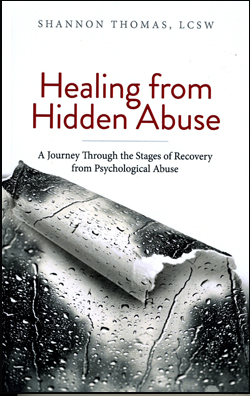 Book Review: Healing from Hidden Abuse, by Shannon Thomas, LCSW
Book Review: Healing from Hidden Abuse, by Shannon Thomas, LCSW
Review by Donna Andersen
Mind games everyone who has tangled with a sociopath, psychopath, narcissist or other exploiter knows them. The sociopath makes a statement, and then denies ever saying the words. You call out the sociopath’s bad behavior, and it’s all turned around on you. And the lies well, the objective of lies is to poison your perceptions.
The more formal term for this destructive behavior is psychological abuse. And now there’s a book that explains exactly what psychological abuse is, why perpetrators engage in it, and the steps of recovery.
Healing from Hidden Abuse —A Journey Through the Stages of Recovery from Psychological Abuse, was written by Shannon Thomas, LCSW. It’s the first book I’ve seen that specifically addresses the mind games played by disordered individuals.
Why do these people engage in psychological abuse? Because they want to. Shannon writes:
“Psychological abusers damage others not out of impaired judgment but because they enjoy the control they gain from abusing people ”¦ Psychological abusers play games with their targets and know precisely what they are doing. Some will even admit they enjoy being the puppet master and keeping people off balance for their entertainment. Others don’t outwardly disclose it, but their enjoyment comes bleeding through with a casual smirk or hateful chuckle.”
Types of abuse
Shannon describes how psychological abuse plays out in different types of relationships, and typical tactics. For example:
- With romantic partners, the abuser frequently engages in a “come close, then disappear” act.
- Toxic friends violate boundaries.
- Psychologically abusive families divide and conquer.
- Toxic employers yell at and publicly mock their targets.
- Abusive religious leaders misapply Scripture, especially regarding forgiveness, divorce, and accepting intolerable behaviors.
How do the abusers do this and get away with it? Essentially, they are great actors, and will use whatever tools will help to accomplish their objectives, like fake emotions. Shannon writes:
“Most outwardly expressed emotions of psychological abusers are for a distinct purpose; that is usually to harm others in some way. Their actions cannot be trusted nor can they be taken at face value.”
Stages of recovery
The bulk of Shannon’s book describes what she has identified as six stages of recovery from psychological abuse. They are:
Stage 1 – Despair
You’ve reached the point of, “I can’t do this anymore.”
Stage 2 – Education
You finally get an inkling that it’s not you, it’s them, and there’s a name for what you are experiencing. You obsessively seek out information.
Stage 3 – Awakening
You start feeling clarity and empowerment to make a change. But it’s not steady journey; you may slip back and forth between despair and awakening.
Stage 4 – Boundaries
You decide to implement No Contact, or what Shannon describes as Detached Contact. Sometimes you can’t get a person out of your life, such as when you share children. In those cases, you need physical and emotional boundaries.
Stage 5 – Restoration
You replace what was broken or stolen, and choose to live again.
Stage 6 – Maintenance
You continue your personal healing. With your hard-won wisdom, you become selective about whom you allow into your life.
The Journal
Psychological abusers, by definition, mess with your mind, so the recovery process is primarily psychological and emotional. A great tool to use is journaling. Writing about your experiences and how you feel about them helps to clear up your confusion. With greater clarity, you can make decisions and move forward.
Shannon has included a “Personal Reflections Journal” at the end of her book. For each section of the book, Shannon includes questions and prompts so you can apply the concepts she writes about to your own experience. This brings the ideas to life, so true healing can begin.
If you’re still not sure what happened in your involvement with a particular individual, Healing from Hidden Abuse may help you figure out if you were psychologically abused.
If the answer is yes, you were abused, then Shannon Thomas’ book is an excellent tool to guide you to recovery.
Healing from Hidden Abuse A Journey Through the Stages of Recovery from Psychological Abuse is available on Amazon.com.




































 Romance Scams Part 4: Fake dating apps and malware
Romance Scams Part 4: Fake dating apps and malware
regretfullymine
I bought this book not long ago, from Amazon. And…I heartily recommend it!! Shannon Thomas writes clearly, plainly. I am still re-reading and re-re-reading this book. It helps put a name on what I lived with, all those awful years with a psychopath (and others who I know now, are psychopathic of one kind or another). BUY THIS BOOK! I knew the ex was psychopath, but this book confirmed it. BUY THIS BOOK!!!
Maggiemuggins
I am an on and off journaler.I happened to find some stuff i had written a few years ago. It helped tremendously. I had felt i was going crazy. I had been walking around holding my head but helpless to leave. I undeestood what was going on theft cheating gaslighring forgery. Right down to lying in bed one mornine feeling totally flacid.i felt like i remember seeing ingrid bergman looking like in Glasslighting. That look like the border between sane or insane. I thought this isnt me. Somehow i got the strength to move.
Journaling may help healing but for me it was an anchor. I could see what i wrote and know the marbles were still there. I could look to remember the cruely or the twisted stories and know i was dealing with something very sick. When i was confused there was the truth..Documenting everything stolen or broken helped me get it out of my head and onto paper. Other than having to be alert i decided not to give hum one more minuite of the rest of my life. Whats interesting is that person is gone. After changing locks many times.accounts. getting tons of hangups……but tracking lots of them down. Death threats, having my steeribg wheel seize and a network i found on my computer in my house all over Washington state, idaho and british columbia. Call forwarding so i thought he was home and the heels clicking across the floor and giggling. There is nothing because he wasnt real. No emotuon ” empathy
Nothing! All we can do is cloae the door and if a thought creeps in Stop it! Phone someone read a book go for a walk. Dont squander any more of your life on that.
Someone before Christmas said something and i wanted answer. To say Happy New Year. Its a brand new start. But i am techie challenged so never joined in …….i am sorry i hope you are ok. Maggie
Sunnygal
She says the abuser does a ‘come close, disappear act’. I have experienced this.
I journal things done by a narcissistic neighbor. It does help to get things down on paper.
andwhat
I need solid advice, since I’ve almost totally lost the relationship with my son. I’ve been through the counseling and finally understand what I was up against. The jerk chose me from the start because of my vulnerability at the time. But now my issue is trying to explain to my son who is 22 and who was nearly broken emotionally from the experience; I had divorced my son’s father and jumped right into this malignant narcissist marriage. My son keeps saying that if it was drug addiction he could understand. He asks, ‘why didn’t we just leave?’ Help!
sinjarikr
I love this book so much that I have it in an audio book and paperback ?